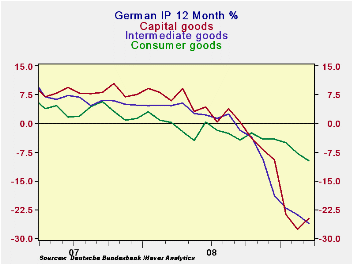 Global| May 08 2009
Global| May 08 2009German Industrial Output Halts Its Strong Of Declines
Summary
German industrial production halted its string of six consecutive declines with a flat result in March. Over three months the negative growth rate for IP has flattened but at a still horrific -33% (saar). Ironically, the capital goods [...]

German industrial production halted its string of six
consecutive declines with a flat result in March. Over three months the
negative growth rate for IP has flattened but at a still horrific -33%
(saar). Ironically, the capital goods sector shows the worst results
and fasted decline in its three month rate of growth compared to other
sectors. Yet the capital goods sector is the only sector with an output
increase in March – and a strong one at that.
Construction is in its second month of increasing output.
However, manufacturing output fell in March, but it did trim that drop
to -0.2% from -3.5% previously. And of course the flat IP result fits
in nicely with the surge in German orders in March. The process of
blunting the forces of the downturn and establishing an environment of
growth is now fully engaged in Germany, Europe’s largest economy.
Coupled with the fresh ECB rate cut and the ECB’s decision on to engage
in covered bond purchases, Europe has some new reason for hope.
| Total German IP | |||||||
|---|---|---|---|---|---|---|---|
| Saar exept m/m | Mar-09 | Feb-09 | Jan-09 | 3-mo | 6-mo | 12-mo | Quarter-to-Date |
| IP total | 0.0% | -3.4% | -6.3% | -32.7% | -33.1% | -20.3% | -40.1% |
| Consumer | -2.0% | -3.7% | -0.6% | -22.7% | -14.6% | -9.8% | -13.9% |
| Capital | 2.5% | -5.2% | -13.5% | -50.1% | -41.5% | -24.7% | -55.8% |
| Intermed | -2.4% | -1.3% | -4.0% | -27.0% | -40.4% | -26.2% | -43.9% |
| Memo | |||||||
| Construction | 7.6% | 1.9% | -7.5% | 5.5% | 14.6% | 4.9% | -0.6% |
| MFG IP | -0.2% | -3.5% | -7.7% | -37.8% | -37.1% | -22.9% | -45.7% |
| MFG Orders | 3.3% | -3.1% | -6.7% | -23.9% | -43.3% | -33.1% | -46.5% |
Robert Brusca
AuthorMore in Author Profile »Robert A. Brusca is Chief Economist of Fact and Opinion Economics, a consulting firm he founded in Manhattan. He has been an economist on Wall Street for over 25 years. He has visited central banking and large institutional clients in over 30 countries in his career as an economist. Mr. Brusca was a Divisional Research Chief at the Federal Reserve Bank of NY (Chief of the International Financial markets Division), a Fed Watcher at Irving Trust and Chief Economist at Nikko Securities International. He is widely quoted and appears in various media. Mr. Brusca holds an MA and Ph.D. in economics from Michigan State University and a BA in Economics from the University of Michigan. His research pursues his strong interests in non aligned policy economics as well as international economics. FAO Economics’ research targets investors to assist them in making better investment decisions in stocks, bonds and in a variety of international assets. The company does not manage money and has no conflicts in giving economic advice.






